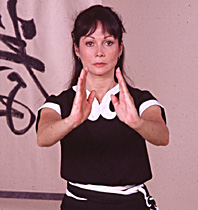GOLDSEA | ASIAMS.NET | ASIAN AMERICAN PERSONALITIES
SUSIE WONG REVISITED
PAGE 4 OF 6
| "Most of the kids didn't even know where Hong Kong was." |
 ancy Kwan refuses to divulge her birthday but she was probably born around 1941 in Hong Kong to a Chinese father and an English mother. Her family appears to have enjoyed the wealth and privileges of the crown colony's highest Chinese professional class. Her paternal grandfather had studied at MIT, and Kwan's father at Oxford. While fulfilling one of his architectural degree requirements by doing art direction on a film set, he met Kwan's mother, an actress from a middle-class family.
ancy Kwan refuses to divulge her birthday but she was probably born around 1941 in Hong Kong to a Chinese father and an English mother. Her family appears to have enjoyed the wealth and privileges of the crown colony's highest Chinese professional class. Her paternal grandfather had studied at MIT, and Kwan's father at Oxford. While fulfilling one of his architectural degree requirements by doing art direction on a film set, he met Kwan's mother, an actress from a middle-class family.
The couple's first child was a son born two years before Nancy. Cultural differences proved too much for Mrs Kwan, and the couple divorced when Nancy was two. Her mother returned to live in England, coming back to Hong Kong just once to visit her children. Kwan's father didn't wait long to provide his children with a Chinese stepmother. Within a few years Kwan had five younger siblings. She got along well with her stepmother and had a happy, well-adjusted tomboy childhood with "lots of friends". Her activities ran to flying kites with her brother and the boys rather than playing with dolls. But at the age of 8 she began studying ballet and nurtured the ambition to attend England's famous Royal Ballet. She was something of a teacher's pet at the Maryknoll Convent School.
Kwan had had an easy and affectionate relationship with her father who was fun, not at all like the stereotypical stern Chinese father. He was considered quite outspoken in his upper crust circles. A successful architect, he was able to provide his large family with a mansion of his own design with several amahs, gardeners and a chauffeur.
At the age of 12 Kwan was sent to a "public" (private) boarding school in Kingsmoor in Northern England with the expectation that she would study ballet twice a week in Manchester to prepare for the exam to enter the Royal Ballet. The school was co-ed with a separate girl's dorm. There were some international students, including a few from Thailand and three Hong Kong Chinese. "Most of the kids didn't even know where Hong Kong was," recalls Kwan. She suffered the pain of being called "chink", but she responded in kind and got into a fight or two. The school was genteel, she says, and the racism wasn't as rough as in "private" (public) schools. She was friends with some English girls as well as the girls from Hong Kong and "wasn't unpopular". She recalls the teachers as having been nice but she wasn't the teacher's pet she had been at Maryknoll. She received the "average" amount of attention from boys and went out on a few dates, but had no steady boyfriend or a love interest while at Kingsmoor.

Kwan regularly practices tai chi, "moving meditation" as a way to keep herself centered.
Her English mother visited a few times and Kwan spent the holidays with her maternal grandmother in Brighton. She recalls asking her mother about their divorce and was told that they had simply grown apart, that Hong Kong was too strange. She didn't hold it against her mother for leaving, says Kwan. She occasionally saw her older brother who was attending Bromsgrove, a well-known school her father had attended.
Ballet was one activity Kwan was serious about. She spent a great deal of time training on top of the semi-weekly lessons at Manchester. Her efforts paid off -- she passed the rigorous examination to enter the Royal Ballet. At the age of 16 she was one of 12 girls in the starting class.
Last year Kwan played a doctor in an as yet unreleased film called Taste of Freedom, co-starring Jane Seymour, about Hong Kong's return to China. She is enthusiastic about a recent role in a play at the prestigious Los Angeles Theater Center. Being under no compulsion to act, she turned down the Madame Mao role in another play. "I looked at the script. I didn't think it was ready."
She dances regularly at a studio near her house and practices tai chi ("moving meditation," in Kwan's words) to keep herself "centered". The week after the interview she is filming a video that combines tai chi with yoga, both being forms of gentle exercise.
Perhaps because of her spectacular and unexpected early successes, Kwan seems to have developed a strong belief in what she calls "the rhythm of life". "There is a definite time and place and a sequence, a rhythm to the world. We're all on a rhythm and you try not to get off that rhythm." She denies that it is a fatalistic mindset. "If you tap into that rhythm I think you can be very powerful. You hear it if you meditate a lot. On a practical level you make time for looking into yourself." PAGE 5
| PAGE 1 | 2 | 3 | 4 | 5 | 6 |
CONTACT US
|
ADVERTISING INFO
© 1996-2013 Asian Media Group Inc
No part of the contents of this site may be reproduced without prior written permission.
